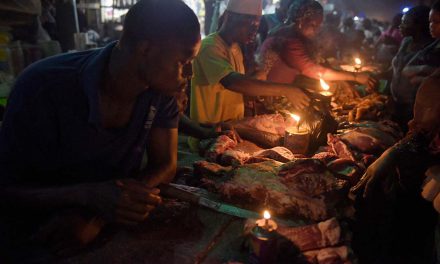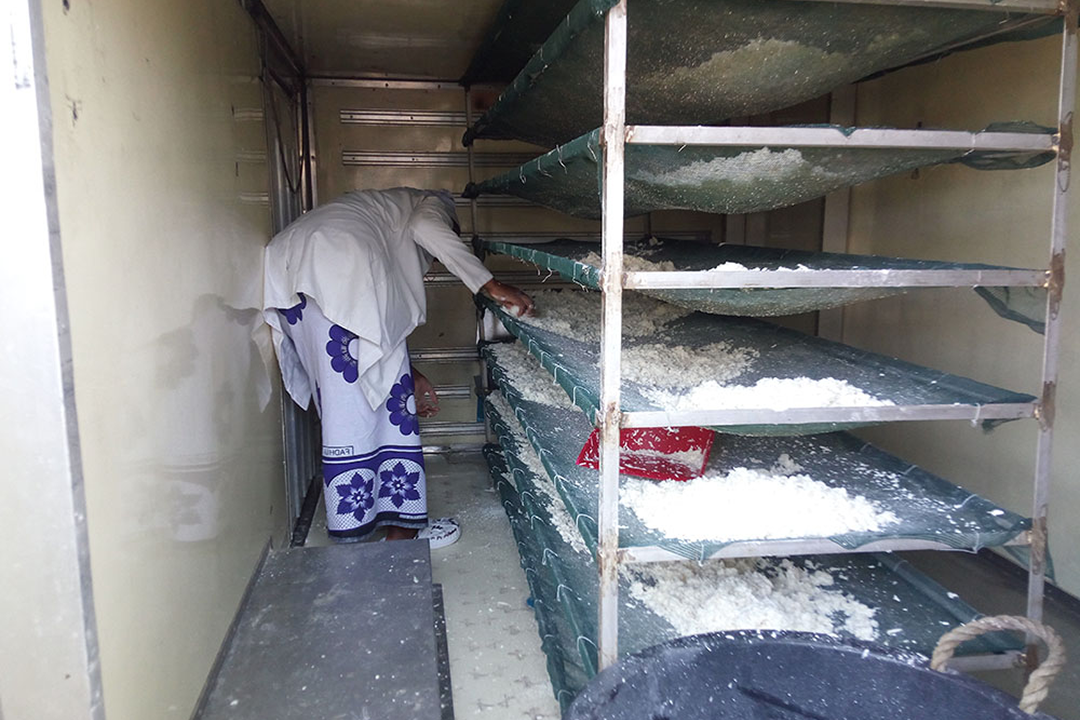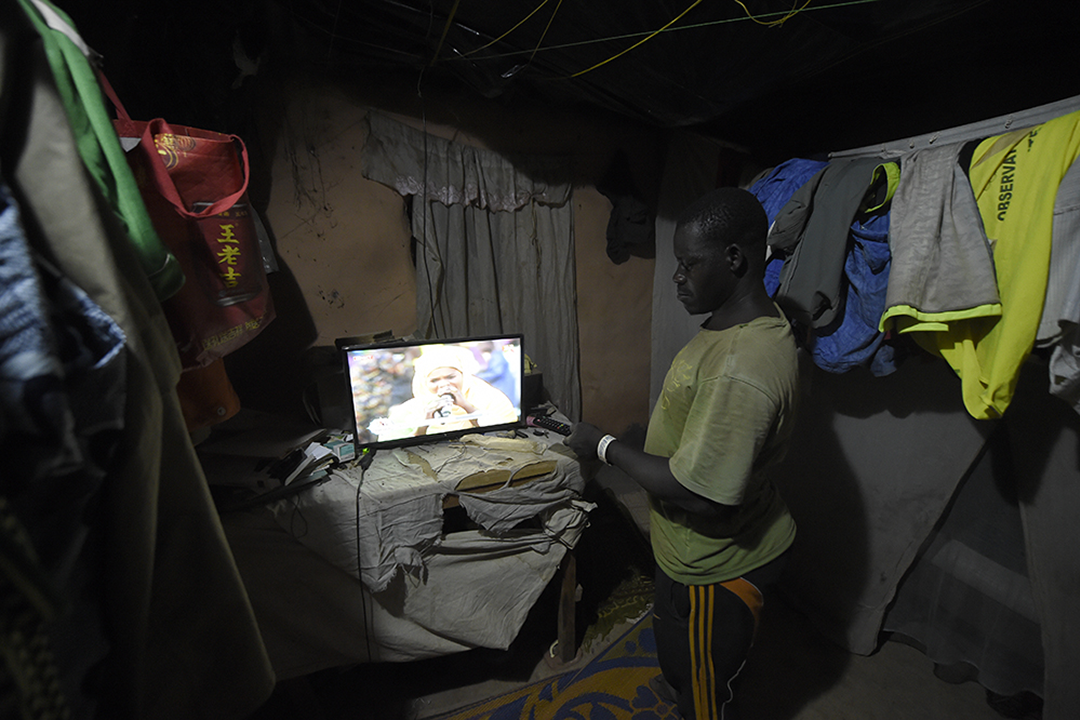Being forced to use generators to supplement erratic power supplies is a heavy burden for African business
Menye Ndzana, a welder-cum-musician popularly known as Le Grand Barack, suddenly rose to national prominence in Cameroon in the wake of the 2018 presidential election when he took to social media to vent his anger over a lack of power to run his small welding workshop in the Elig-Mfomo community, 64km north of the capital, Yaounde.
Le Grand Barack had just voted for the then 85-year-old Paul Biya, enabling the president to extend his 36-year rule by another seven years. But Le Grand Barack had a fundamental problem; intermittent power supply was turning his life upside-down and depriving him of a livelihood. “I did not know it was going to be like this. Because of Eneo (Energy of Cameroon), we are suffering,” Le Grand Barack exclaimed back then, unable to fulfil orders placed at his welding workshop for lack of electricity. He regretted voting for Biya, whose policies over the years have not guaranteed a steady supply of electricity.
Following his outcry, Le Grand Barack was gifted a 5.5 kVA fuel generator. It was a relief, but the welder has since had financial difficulties with running the generator. Generators are a common feature in next-door Nigeria, Africa’s largest economy. Most enterprises own them to address regular electricity blackouts. But the widespread use of generators is potentially damaging. The World Health Organization estimates that 4.2 million people globally in both rural and urban areas met an untimely death in 2016 alone, due to outdoor air pollution linked to combustion, including generators.
The rampant use of back-up generators is also a substantial source of noise pollution. The situation is so acute that Nigerian superstar singer and songwriter Tekno captured it in his 2016 hit song Rara, writing “Generator wan tear my ear”.
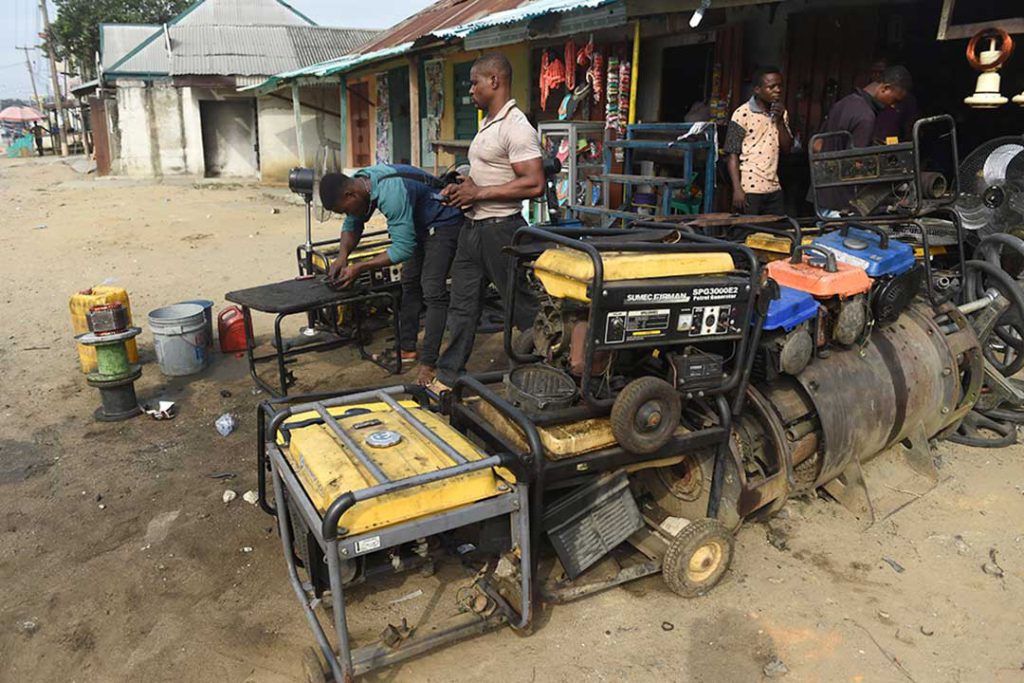
A roadside mechanic repairs electricity generators that are believed to contribute to the environmental pollution in Port Harcourt city, Rivers State, on February 14, 2017. – The Nigerian city of Port Harcourt used to be known as “The Garden City”, since late last year, black soot has been falling from the sky, scaring and angering residents who claim nothing is being done to protect their health. (Photo by PIUS UTOMI EKPEI / AFP)
Despite their negative impact on health and the environment, the reliance on generators remains essential in keeping businesses running in a continent chiefly marked by poor and/or unreliable power supply. According to a 2019 report, Electricity Access in Sub-Saharan Africa, produced by the World Bank and the French Development Agency, only two-fifths of sub-Saharan Africa’s population has access to electricity. Over 600 million people on the continent remain without electricity, including more than 80% of those living in rural areas. This makes Africa the region with the lowest rate of access to electricity in the world.
According to Samuel Ayokunle Olowosejeje, a PhD researcher at University College Cork in Ireland, Africa still struggles with power supply, despite its enormous energy potential – due to the absence of energy policies, or ineffective energy policies where they do exist. He also blames the poor and/or unreliable power supply on the lack of a maintenance culture, inadequate regulations and the inability to enforce regulations as well as the mismanagement of funds and operations usually stemming from corruption, technical ineptitude and technology paucity, among others.
“Sub-Saharan Africa’s electric power supply-to-demand shortfall has been widely documented. The electrification rate of most sub-Saharan African countries, excluding South Africa, is less than 30%, with an average electrification rate of 16% in rural communities. The paucity of electricity supply in the region is quite alarming,” Olowosejeje told Africa in Fact.
Experts are unanimous that reliable electricity supply is key to the functioning of any modern economy, especially with the advent of the digital revolution. Yet the reliability of electricity supply remains a big hurdle in Africa, with firms experiencing outages outnumbering those in any other region.
“We found that unreliable power can have a major impact on businesses, dampening their growth prospects and undermining job creation opportunities,” says Vijaya Ramachandran, senior fellow at the non-profit think tank, Center for Global Development.
World Bank data show that on average each year, countries in sub-Saharan Africa experience between 50 hours and 4,600 hours of power outage, amounting to more than half a year in some countries. Last year, 78% of firms operating on the continent reported having experienced power interruptions, 41% of which considered these blackouts as a major constraint to their business operations.
Considering that back-up generators are actually deployed in 75% of places which are grid-connected, this inflicts substantial financial and non-monetary costs on businesses, individuals, and the environment. For instance, in Nigeria, which tops the list of countries using diesel and gasoline back-up generators in Africa, citizens spend $14 billion on fuel and generators yearly, according the African Development Bank. The International Monetary Fund (IMF), meanwhile, asserts that limited access to electricity and unreliable power supply is a major setback to doing business in Nigeria, and estimates the West African country loses $29 billion each year because of that.
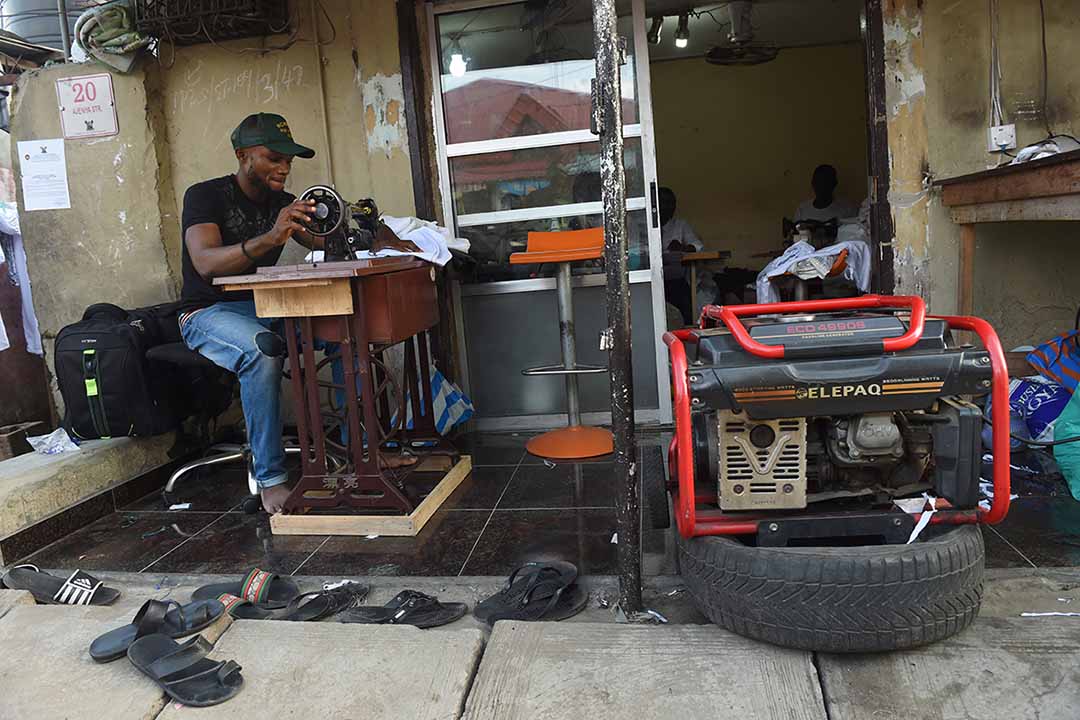
A tailor uses a generator for power due to the epileptic public power supply in Lagos. Photo: Pius Utomi Ekpai/AFP
The International Finance Corporation in its September 2019 report, ‘The Dirty Footprint of the Broken Grid’, highlights that generators gulp some 20% of the gasoline and diesel consumed in sub-Saharan Africa at a cost of approximately $28 billion to $50 billion every year. The IMF points out that this amount translates to an average service cost of $0.30/kWh for the fuel alone (ranging from $0.20/kWh to $0.60/kWh depending on generator size and fuel type), generally much higher than the cost of grid-based energy ($0.10–0.30/kWh). Besides, there is also a cost associated with running and maintaining generators, that can add an extra 10-20% to fuel service costs.
Related data from the 2018 World Bank Enterprise Survey, which included 139 economies, unveils an indirect cost associated with poor and/or unreliable power supply. It indicates that unmitigated estimated outage costs range from $2 to $32 per kWh, depending on the level of a firm’s vulnerability to power interruptions. Also, the data shows that the estimated back-up (self-generation) cost in Africa is $0.47/kWh, approximately three times higher than cost-reflective tariffs of grid-supplied energy in countries like Nigeria (~$0.15/kWh) and Uganda ($0.17/kWh).
The World Bank’s Electricity Access in Sub-Saharan Africa report points out: “The results of the estimation show a strong negative effect of outages on the value-added output and productivity of firms in the region: for every percentage point increase in the frequency of electricity outages experienced by firms, real value added (output) declines by 3.3%. Similarly, the effect on firms’ revenue is non-trivial, given that a percentage point increase in outage frequency results in a 2.7% loss in firm revenue.”
To reverse the tide and find lasting solutions that could improve the continent’s electrification rate, Olowosejeje proposes multiple-stage solutions. Firstly, he proposes putting in place a politically stable environment, ensuring access to reliable energy data that is readily available, and energy policies with policy actions supported by an enabling legislative and regulatory infrastructure.
Also, there is a need to increase access to development finance for energy solutions, exploring mechanisms that incentivise investment in alternative energy solutions (towards diversifying the continent’s energy portfolio). Energy technology – aimed at developing technical aptitude – also needs to be disseminated.
“There is a need for community engagement (community-based participatory research) in determining best-fit solutions, as well as inculcating a community-wide energy technology sustenance culture,” Olowosejeje said. “The first stage serves as the building blocks for the successful implementation of the second stage, with the final stage ensuring community-wide energy solutions sustenance post-implementation.”
Amindeh Blaise Atabong is a Cameroonian freelance journalist. His interests include gender, human rights, climate change, environment, tech, conflict, peace-building and global development. In 2019, he was a finalist in the inaugural True Story Award, and also won a prestigious Kurt Schork Award in International Journalism. His works have been published by independent regional and international outlets, including Quartz, Mail & Guardian, Reuters, Jeune Afrique, Epoch Times, African Arguments and Equal Times.


